Deck 15: Glm 4: Repeated-Measures Designs
Question
Question
Question
Question
Question
Question
Question
Question
Question
Question
Question
Question
Question
Question
Question
Question
Question
Question
Question
Question
Question
Question
Question
Question

Unlock Deck
Sign up to unlock the cards in this deck!
Unlock Deck
Unlock Deck
1/24
Play
Full screen (f)
Deck 15: Glm 4: Repeated-Measures Designs
1
The Greenhouse-Geisser correction refers to
A) Temperature control
B) A way of dealing with sphericity
C) Raising the sample size
D) Lowering humidity
A) Temperature control
B) A way of dealing with sphericity
C) Raising the sample size
D) Lowering humidity
A way of dealing with sphericity
2
In a study undertaken by Alla et al. (2009) to determine whether exercise evoked neurological symptoms in healthy subjects, the following result was reported in respect of the interaction between level of exercise intensity and time: F(2, 118) = 23.94, p < 0.001 for intensity condition following exercise. (Source: Alla, S., Sullivan, S. J., McCrory, P., Schnieders, A. G., & Handcock, P. (2010). Does exercise evoke neurological symptoms in healthy subjects? Journal of Science and Medicine in Sport, 13(1), 24-26.) Which of the following statements best represents this result?
A) The effect of intense exercise has little effect on players returning to their sport.
B) The effect of intense exercise needs to be acknowledged when making 'return to play' decisions for athletes.*
C) The effect of intense exercise increases over time.
D) None of the above.
A) The effect of intense exercise has little effect on players returning to their sport.
B) The effect of intense exercise needs to be acknowledged when making 'return to play' decisions for athletes.*
C) The effect of intense exercise increases over time.
D) None of the above.
The effect of intense exercise needs to be acknowledged when making 'return to play' decisions for athletes.*
3
In the output below, what does Mauchly's test of sphericity indicate? 
Source:http://www.lifesci.sussex.ac.uk/home/Zoltan_Dienes/RM%20II%20SPSS%20repeated%20measures.doc
A) Not significant*
B) Significant
C) Highly significant
D) None of the above

Source:http://www.lifesci.sussex.ac.uk/home/Zoltan_Dienes/RM%20II%20SPSS%20repeated%20measures.doc
A) Not significant*
B) Significant
C) Highly significant
D) None of the above
Not significant*
4
When sphericity is violated, what test statistics should be used?
A) ANCOVA
B) MANOVA
C) MANCOVA
D) None of the above
A) ANCOVA
B) MANOVA
C) MANCOVA
D) None of the above

Unlock Deck
Unlock for access to all 24 flashcards in this deck.
Unlock Deck
k this deck
5
In a repeated-measures design with one factor of four levels and three participants, what are the residual degrees of freedom?
A) 3
B) 2
C) 12
D) 11 *
A) 3
B) 2
C) 12
D) 11 *

Unlock Deck
Unlock for access to all 24 flashcards in this deck.
Unlock Deck
k this deck
6
An experiment was carried out in which participants learned words in several conditions: no learning strategy, a verbal learning strategy, a visual one and a verbal-visual one. What considerations would the researchers not need to take into account?
A) Fatigue
B) Learning effects
C) Asymmetric transfer
D) Parametric assumptions
A) Fatigue
B) Learning effects
C) Asymmetric transfer
D) Parametric assumptions

Unlock Deck
Unlock for access to all 24 flashcards in this deck.
Unlock Deck
k this deck
7
In the analysis of the table below, the SS are all the same no matter which sphericity correction is applied. This means 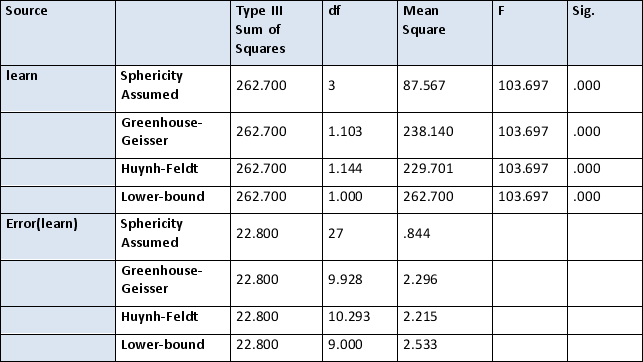
A) The data across all levels is uncorrelated
B) The data across all levels is correlated
C) The distributions across the levels forms a sphere
D) Not enough information

A) The data across all levels is uncorrelated
B) The data across all levels is correlated
C) The distributions across the levels forms a sphere
D) Not enough information

Unlock Deck
Unlock for access to all 24 flashcards in this deck.
Unlock Deck
k this deck
8
When repeated measures are used, which assumption is violated?
A) Scores in the same conditions are dependent.
B) Scores in the same conditions are independent.
C) Scores in different conditions are independent.
D) Scores in different conditions are dependent.
A) Scores in the same conditions are dependent.
B) Scores in the same conditions are independent.
C) Scores in different conditions are independent.
D) Scores in different conditions are dependent.

Unlock Deck
Unlock for access to all 24 flashcards in this deck.
Unlock Deck
k this deck
9
The following SPSS output represents three conditions (based on groups of individuals capacity to undertake a specific test in relation to computer use) and sphericity has not been violated. How would the difference between conditions be reported? 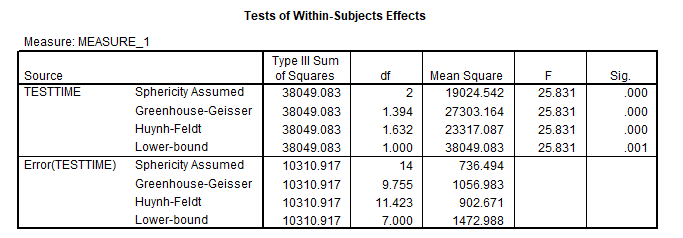 Source:http://www.lifesci.sussex.ac.uk/home/Zoltan_Dienes/RM%20II%20SPSS%20repeated%20measures.doc
Source:http://www.lifesci.sussex.ac.uk/home/Zoltan_Dienes/RM%20II%20SPSS%20repeated%20measures.doc
A) F(2,14) = 25.83, p > 0.001
B) F(2,14) = 25.83, p < 0.01
C) F(1,7) = 25.83, p > 0.001
D) F(1,7) = 25.83, p < 0.01
 Source:http://www.lifesci.sussex.ac.uk/home/Zoltan_Dienes/RM%20II%20SPSS%20repeated%20measures.doc
Source:http://www.lifesci.sussex.ac.uk/home/Zoltan_Dienes/RM%20II%20SPSS%20repeated%20measures.docA) F(2,14) = 25.83, p > 0.001
B) F(2,14) = 25.83, p < 0.01
C) F(1,7) = 25.83, p > 0.001
D) F(1,7) = 25.83, p < 0.01

Unlock Deck
Unlock for access to all 24 flashcards in this deck.
Unlock Deck
k this deck
10
An experiment was carried out in which participants learned words in several conditions: no learning strategy, a verbal learning strategy, visual one and a verbal-visual one. What safeguard could the researchers put in place to overcome the difficulties with repeated measures?
A) Counterbalancing
B) Something to keep the participants awake
C) Measure an appropriate covariate
D) Before and after measurements
A) Counterbalancing
B) Something to keep the participants awake
C) Measure an appropriate covariate
D) Before and after measurements

Unlock Deck
Unlock for access to all 24 flashcards in this deck.
Unlock Deck
k this deck
11
A nutritionist conducted an experiment on memory for dreams. She wanted to test whether it really was true that eating cheese before going to bed made you have bad dreams. Over three nights, the nutritionist fed people different foods before bed. On one night they had nothing to eat, a second night they had a big plate of cheese, and the third night they had another dairy product, milk, before bed. All people were given all foods at some point over the three nights. The nutritionist measured heart rate during dreams as an index of distress. How should these data be analysed?
A) One-way independent ANOVA
B) One-way repeated measures ANOVA
C) Three-way repeated measures ANOVA
D) Three-way independent ANOVA
A) One-way independent ANOVA
B) One-way repeated measures ANOVA
C) Three-way repeated measures ANOVA
D) Three-way independent ANOVA

Unlock Deck
Unlock for access to all 24 flashcards in this deck.
Unlock Deck
k this deck
12
What is not a form of counterbalancing?
A) Even-number algorithms
B) Odd-number algorithms
C) Random number algorithms
D) Heuristics
A) Even-number algorithms
B) Odd-number algorithms
C) Random number algorithms
D) Heuristics

Unlock Deck
Unlock for access to all 24 flashcards in this deck.
Unlock Deck
k this deck
13
Which of the following is not a source of variability in repeated-measures ANOVA
A) Between factors
B) Between treatments
C) Between individuals
D) Residual
A) Between factors
B) Between treatments
C) Between individuals
D) Residual

Unlock Deck
Unlock for access to all 24 flashcards in this deck.
Unlock Deck
k this deck
14
An experiment was carried out in which participants learned words in several conditions: no learning strategy, a verbal learning strategy, visual one and a verbal-visual one. The table below outlines the results from this experiment? What does this table indicate? Tests of Within-Subjects Effects
Measure: MEASURE_1
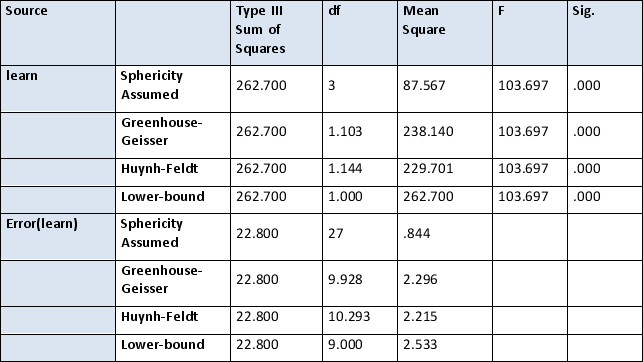
A) There is too much sphericity in the model.
B) There are too many errors in the model.
C) The null hypothesis can be rejected.
D) The null hypothesis must be rejected.
Measure: MEASURE_1

A) There is too much sphericity in the model.
B) There are too many errors in the model.
C) The null hypothesis can be rejected.
D) The null hypothesis must be rejected.

Unlock Deck
Unlock for access to all 24 flashcards in this deck.
Unlock Deck
k this deck
15
Which of the following statements about the assumption of sphericity is not true?
A) It is tested using Mauchly's test in SPSS.
B) It does not apply when a variable has only two levels.
C) It does not apply when multivariate tests are used.
D) It is the assumption that the variances for levels of a repeated-measures variable are equal.
A) It is tested using Mauchly's test in SPSS.
B) It does not apply when a variable has only two levels.
C) It does not apply when multivariate tests are used.
D) It is the assumption that the variances for levels of a repeated-measures variable are equal.

Unlock Deck
Unlock for access to all 24 flashcards in this deck.
Unlock Deck
k this deck
16
If there is sphericity in a repeated-measures design the outcome could be that
A) The p-value will be too high.
B) The p-value will be too low.
C) A p-value cannot be computed.
D) The p-value will not be related to the model
A) The p-value will be too high.
B) The p-value will be too low.
C) A p-value cannot be computed.
D) The p-value will not be related to the model

Unlock Deck
Unlock for access to all 24 flashcards in this deck.
Unlock Deck
k this deck
17
If sphericity is to be an issue in a repeated-measures design, what is the minimum number of conditions required?
A) 1
B) 2
C) 3
D) None of the above
A) 1
B) 2
C) 3
D) None of the above

Unlock Deck
Unlock for access to all 24 flashcards in this deck.
Unlock Deck
k this deck
18
What is not an advantage of repeated-measures designs in comparison to independent measures designs?
A) Each participant acts as their own control.
B) Researchers can study cross-cultural effects more easily.
C) Researchers can study trends more easily.
D) They require fewer participants overall.
A) Each participant acts as their own control.
B) Researchers can study cross-cultural effects more easily.
C) Researchers can study trends more easily.
D) They require fewer participants overall.

Unlock Deck
Unlock for access to all 24 flashcards in this deck.
Unlock Deck
k this deck
19
What is sphericity?
A) An assumption that means the data distribution must be round.
B) The critical value area of the graph is round.
C) A way of rounding up the decimal points.
D) An assumption that means the data in each level should uncorrelated.
A) An assumption that means the data distribution must be round.
B) The critical value area of the graph is round.
C) A way of rounding up the decimal points.
D) An assumption that means the data in each level should uncorrelated.

Unlock Deck
Unlock for access to all 24 flashcards in this deck.
Unlock Deck
k this deck
20
When the assumption of sphericity is violated what action is needed?
A) Correct the model degrees of freedom.
B) Correct the error degrees of freedom.
C) Do both a and
D) Correct the F-ratio.
A) Correct the model degrees of freedom.
B) Correct the error degrees of freedom.
C) Do both a and
D) Correct the F-ratio.

Unlock Deck
Unlock for access to all 24 flashcards in this deck.
Unlock Deck
k this deck
21
The following result is reported for a study by Kain et al. (2008) on the number of parents who should be let into the operating room. In respect of parental anxiety along two time points (holding area and separation from children) a two-way ANOVA with repeated measures evaluation was performed with the following result in relation to group × time interaction: F(1,95) = 7.78, p = 0.006. In the one-parent group versus the parents in the two-parent group the result is shown as 48.6 + 13.1 vs. 39.7 +11.5, p < 0.02. (Source: Kain, Z. N., MacLaren, J., Weinberg, J., Huszti, H., Anderson, C., & Mayes, L. (2009). How many parents should we let into the operating room? Paediatric Anaesthesia, 19(3), 244-249.) What does this result mean?
A) Higher anxiety levels are evident in the two-parent group.
B) Higher anxiety levels are evident in the one-parent group.
C) Lower anxiety levels are evident in the two-parent group.
D) Lower anxiety levels are evident in the one-parent group.
A) Higher anxiety levels are evident in the two-parent group.
B) Higher anxiety levels are evident in the one-parent group.
C) Lower anxiety levels are evident in the two-parent group.
D) Lower anxiety levels are evident in the one-parent group.

Unlock Deck
Unlock for access to all 24 flashcards in this deck.
Unlock Deck
k this deck
22
In a study examining attitudes to ethnic minorities the following output was obtained via SPSS. Assuming sphericity, how would the result be reported? 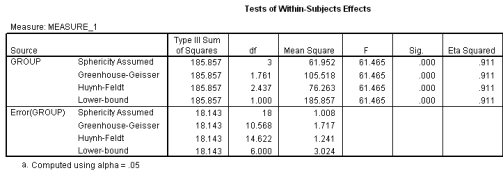
A) F(3,18) = 61.465, p < .01
B) F(3,18) = 61.465, p < .05
C) F(2.44,14.62) = 76.63 p < .01
D) F(2.44,14.62) = 76.63 p < .05

A) F(3,18) = 61.465, p < .01
B) F(3,18) = 61.465, p < .05
C) F(2.44,14.62) = 76.63 p < .01
D) F(2.44,14.62) = 76.63 p < .05

Unlock Deck
Unlock for access to all 24 flashcards in this deck.
Unlock Deck
k this deck
23
In a study examining attitudes to ethnic minorities the following output was obtained via SPSS. In relation to this same experiment and the SPSS output detailed below, what does the information in the following box plot demonstrate? 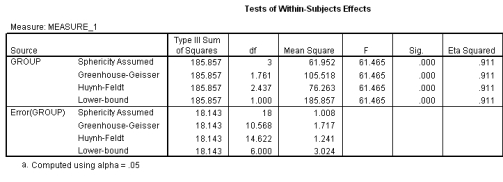
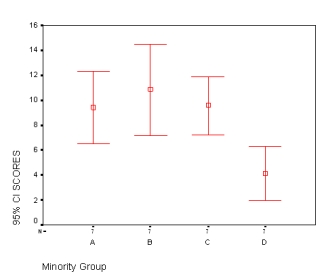
A) Confidence intervals in A, B and C overlap.
B) Confidence intervals in B, C and D overlap.
C) Confidence intervals in D, A and B overlap.
D) None of the above.


A) Confidence intervals in A, B and C overlap.
B) Confidence intervals in B, C and D overlap.
C) Confidence intervals in D, A and B overlap.
D) None of the above.

Unlock Deck
Unlock for access to all 24 flashcards in this deck.
Unlock Deck
k this deck
24
In terms of Mauchly's test of sphericity, what does the table below indicate? 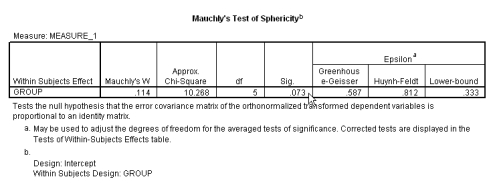
A) The hypothesis of sphericity is accepted.
B) The hypothesis of sphericity is rejected.
C) The hypothesis of sphericity is significant.
D) None of the above.

A) The hypothesis of sphericity is accepted.
B) The hypothesis of sphericity is rejected.
C) The hypothesis of sphericity is significant.
D) None of the above.

Unlock Deck
Unlock for access to all 24 flashcards in this deck.
Unlock Deck
k this deck


